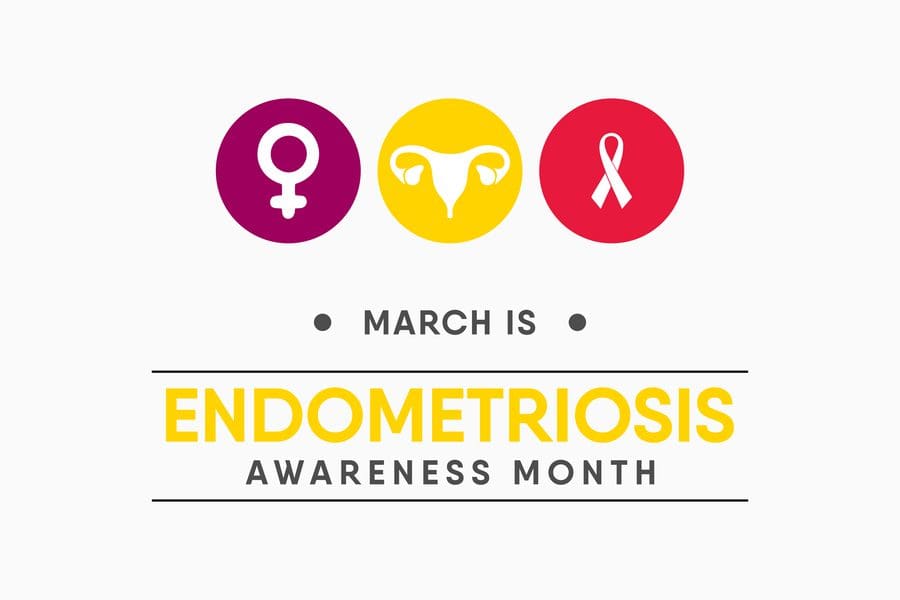March is Endometriosis Awareness Month. One in ten women live with endometriosis – a painful disease where tissue similar to that of the uterine lining (or endometrium) grows outside the uterus. I am one of them.
I struggled with heavy, painful periods for over a decade before being officially diagnosed with endometriosis in January 2021. In the past, my doctor’s solution to my period pain was to stick me on birth control. I didn’t realize something was wrong until my disease started to affect more than just my periods.
Too many women suffer in silence because of the stigma we face when talking about our periods. We’re taught that debilitating period cramps are a natural burden of womanhood. We suffer through painful sex in silence because we’re not supposed to talk about it. As a result, it takes a woman with endometriosis a median of eight years to receive a diagnosis.
This Endometriosis Awareness Month, and I hope to shed some light on the topic by being open about my experience, including the ways that endometriosis affects my everyday life.
Without further ado, here’s what it’s really like to live with endo.
Endometriosis pain is not “normal.”
Living with endometriosis meant that I started taking pain relievers for my period cramps starting at age 12. My mom had to write me a note so I could keep pain relievers in the school nurse’s office. I could barely get through the day without them.
At age 14, I assumed I had a stomach bug when I vomited on my period – and at age 15, I almost passed out during a standardized test due to cramps. Yet when I told my (male) pediatrician about my period cramps, he simply put me on a birth control pill.
Let’s get something straight, ladies: if a doctor tries to tell you that throwing up or passing out due to period pain is “normal cramps,” don’t walk away. Run.
Endometriosis affects me every day – not just on my period.
Two years ago, I started having digestive issues. I was so afraid to eat anything for fear of triggering my symptoms that I lost 15 pounds in a matter of months.
After an upper endoscopy and colonoscopy, a gastroenterologist diagnosed me with irritable bowel syndrome (IBS). I didn’t think it could be related to my painful periods – until I realized that the symptoms almost always coincided with my PMS.
Today, even after endometriosis surgery, I continue to experience IBS symptoms. I am also lactose and gluten-intolerant. I am not alone; women with endometriosis are 2.5 times more likely than other women to have IBS. Women with endometriosis are also almost twice as likely to experience food intolerances.
In other words, endometriosis is more than a reproductive disease. It affects my whole body, including the way I eat, every day – not just on my period.
Endometriosis impacts my body image.
Before I learned I had endometriosis, I didn’t understand why I couldn’t have a flatter stomach. In my freshman year of high school, I started doing obsessive ab workouts and restricting what I ate to control what I saw as my “muffin top.” Yet every day, my stomach continued to blow up like a balloon. In addition to being embarrassing, it was often painful.
I’ve struggled with my body image ever since. However, finding out that I had endometriosis – and that my bloating was a part of it – helped put things in perspective. Google pictures of “endo belly” and you’ll see what I mean: this painful abdominal bloating is one of the most common yet most under-recognized symptoms of endometriosis.
Endometriosis has changed my relationships.
Living with endometriosis affects every relationship in my life, from my friendships to my romantic relationships. Sometimes, you end up staying home with symptoms when you’d rather see friends.
My partner has learned a lot about endo since we started dating, but still, my disease affects our relationship. Since painful sex is another common symptom, being intimate with my partner requires a lot of preparation. I can’t be as spontaneous as we would sometimes like.
On the flip side, endometriosis has also changed many of my relationships for the better – and brought me new friendships. I’ve connected with dozens of women online who also struggle with endometriosis. On the days when it feels like no one in my life understands, being a part of the endo community has been an enormous comfort.
For more information about endometriosis, visit the Endometriosis Foundation of America at endofound.org.







Thank you for the information.
Most people have never heard of it
I, too, was given contraceptive to control my monthly cycle.
I would pass out every month.
Thanks